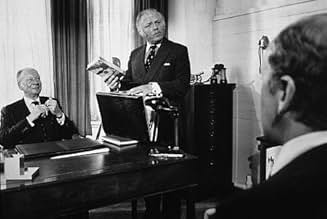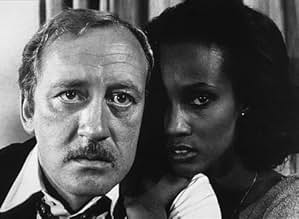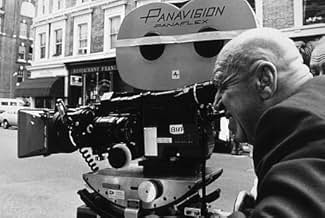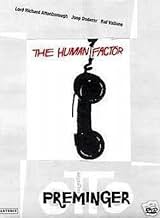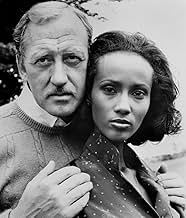VALUTAZIONE IMDb
6,1/10
1721
LA TUA VALUTAZIONE
Aggiungi una trama nella tua linguaWhen a leak of information in the African section of British Intelligence is discovered, security man Daintry is brought in to investigate.When a leak of information in the African section of British Intelligence is discovered, security man Daintry is brought in to investigate.When a leak of information in the African section of British Intelligence is discovered, security man Daintry is brought in to investigate.
- Regia
- Sceneggiatura
- Star
Recensioni in evidenza
Maurice Castle (Nicol Williamson) is a bland mid-level bureaucrat in British intelligence. The only notable fact about him is his African wife Sarah (Iman). His superiors suspect a leak in the firm and decide to quietly eliminate the mole to avoid any publicity. Castle's office mate Arthur Davis (Derek Jacobi) becomes the main target of investigation.
Otto Preminger directs this realistic espionage thriller from a Graham Greene novel with many veteran British actors. With such great pedigree, I expected a great classic but this is definitely second tier level. It does get better in the second half. The first half is a slow slough. Maurice's blandness works against the film during that first half. In fact, he's a side character in his own movie. The production value is limited. This looks more like a TV movie. Preminger is really struggling even considering the budget. The filming is not imaginative and very static. It's almost a throwback to the early black and white movies. The only salvation is the Graham Greene writing which has a sense of realism which is very intriguing. This is a little disappointing.
Otto Preminger directs this realistic espionage thriller from a Graham Greene novel with many veteran British actors. With such great pedigree, I expected a great classic but this is definitely second tier level. It does get better in the second half. The first half is a slow slough. Maurice's blandness works against the film during that first half. In fact, he's a side character in his own movie. The production value is limited. This looks more like a TV movie. Preminger is really struggling even considering the budget. The filming is not imaginative and very static. It's almost a throwback to the early black and white movies. The only salvation is the Graham Greene writing which has a sense of realism which is very intriguing. This is a little disappointing.
After I had read this late Graham Greene novel years ago, I was immediately fascinated by its le Carré-like plot with very much Greene-like characters. I immediately thought that this should have been made into a movie.
Shortly afterwards, I learnt that Preminger had already made it into a film back in 1979, so I was of course very eager to see this movie. Yet - this film has fallen into oblivion, it is not commercially available and it is hardly ever on TV.
Very strange if you consider that it features a cast bristling with splendid British character actors (Nicol Williamson, Derek Jacobi, Robert Morley, Richard Attenborough, to name but a few) and has a screenplay by Tom Stoppard (which IMHO was a straightforward, enjoyable transfer of Greene's novel to the screen).
So, only yesterday did I have the opportunity to watch it on TV. Certainly, it is no cinematographic highlight: it is very low-key, very unfussily directed by Otto Preminger in a more than plain style, and has basically no "action" (but then - what would you expect of a Greene novel?). It might as well have been made for TV, but this impression may also be due to the serious budget problems while filming.
However, it has some splendid performances by actors whom I could watch all day long. The mere cast turns this film into a success and makes it worthwhile watching.
Shortly afterwards, I learnt that Preminger had already made it into a film back in 1979, so I was of course very eager to see this movie. Yet - this film has fallen into oblivion, it is not commercially available and it is hardly ever on TV.
Very strange if you consider that it features a cast bristling with splendid British character actors (Nicol Williamson, Derek Jacobi, Robert Morley, Richard Attenborough, to name but a few) and has a screenplay by Tom Stoppard (which IMHO was a straightforward, enjoyable transfer of Greene's novel to the screen).
So, only yesterday did I have the opportunity to watch it on TV. Certainly, it is no cinematographic highlight: it is very low-key, very unfussily directed by Otto Preminger in a more than plain style, and has basically no "action" (but then - what would you expect of a Greene novel?). It might as well have been made for TV, but this impression may also be due to the serious budget problems while filming.
However, it has some splendid performances by actors whom I could watch all day long. The mere cast turns this film into a success and makes it worthwhile watching.
Tom Stoppard's adaptation, and Preminger's direction, seem to have produced a stylish and grown-up filmed interpretation of Greene's sardonic yet moving condemnation of the cruelty of the Cold-War, during which both the Left and the Right have forgotten 'The Human Factor.'
Both the West and the Soviets are portrayed as they execute a risibly elephantine yet humanly appalling dance of death over the crushed lives of ordinary, decent people.
This remarkably accomplished and understated politico/moral thriller is a far more effective translation of an immeasurably greater book than is the more recent film of John Le Carre's original novel of 'The Tailor of Panama.' The latter film in particular entirely fudges the politics of Noriega's Panama, and the United States' role therein. Preminger's film, by contrast, is amazingly honest and balanced, for its period, about the protagonists of the fraught global struggle of its time. In this it is faithful to Greene's intentions.
No doubt the earlier film was critically sunk by its evident contempt for the received political 'wisdom' of its age. And by its willingness to entertain the possibility that the 'democratic' West could quite easily countenance Nazi-style medical research, both for the removal of inconvenient individuals like the wretched Davis, and for sale to strategic allies like apartheid-era South Africa in the form of a poison gas 'cordon sanitaire' between them and black Africa. Certainly, even the best American reviews (which always heavily preponderate on this Website), while they 'condemn with faint praise,' studiedly avoid any mention of the political and moral core of the film. This is to circumvent, and to radically subvert, the integrity of a serious work.
However, anyone who has actually grown up since then should enjoy and appreciate this rather brilliant - if neglected - film version of a Grahame Greene classic: Script, performances, design and filming are uniformly excellent. It is far, far more than a spy-thriller. Greene's original is faithfully followed into areas that Le Carre merely touches upon.
Special praise and thanks, therefore, to BBC4's original and brave choice to programme it on their new British channel, recently! Naturally, it is not commercially available in Britain. American capitalism, however - to its partial credit! - is capable of allowing this film to exist at least as a product, relying on dialectical hostility to effectively police the public's exposure to such an evidently heretical viewpoint! Sufficient numbers of people will always helpfully parrot the 'official line' that is peddled by our cultural 'commissars' in order to prevent such views spreading in the wildfire manner which a truly free exchange of ideas would permit. Their critical contempt for the viewing public is obviously justified, I regret to say.
Both the West and the Soviets are portrayed as they execute a risibly elephantine yet humanly appalling dance of death over the crushed lives of ordinary, decent people.
This remarkably accomplished and understated politico/moral thriller is a far more effective translation of an immeasurably greater book than is the more recent film of John Le Carre's original novel of 'The Tailor of Panama.' The latter film in particular entirely fudges the politics of Noriega's Panama, and the United States' role therein. Preminger's film, by contrast, is amazingly honest and balanced, for its period, about the protagonists of the fraught global struggle of its time. In this it is faithful to Greene's intentions.
No doubt the earlier film was critically sunk by its evident contempt for the received political 'wisdom' of its age. And by its willingness to entertain the possibility that the 'democratic' West could quite easily countenance Nazi-style medical research, both for the removal of inconvenient individuals like the wretched Davis, and for sale to strategic allies like apartheid-era South Africa in the form of a poison gas 'cordon sanitaire' between them and black Africa. Certainly, even the best American reviews (which always heavily preponderate on this Website), while they 'condemn with faint praise,' studiedly avoid any mention of the political and moral core of the film. This is to circumvent, and to radically subvert, the integrity of a serious work.
However, anyone who has actually grown up since then should enjoy and appreciate this rather brilliant - if neglected - film version of a Grahame Greene classic: Script, performances, design and filming are uniformly excellent. It is far, far more than a spy-thriller. Greene's original is faithfully followed into areas that Le Carre merely touches upon.
Special praise and thanks, therefore, to BBC4's original and brave choice to programme it on their new British channel, recently! Naturally, it is not commercially available in Britain. American capitalism, however - to its partial credit! - is capable of allowing this film to exist at least as a product, relying on dialectical hostility to effectively police the public's exposure to such an evidently heretical viewpoint! Sufficient numbers of people will always helpfully parrot the 'official line' that is peddled by our cultural 'commissars' in order to prevent such views spreading in the wildfire manner which a truly free exchange of ideas would permit. Their critical contempt for the viewing public is obviously justified, I regret to say.
Nicol Williamson remains restrained throughout the film, yet his face is so expressive that it does mirror the emotions and thoughts of his character. His admirable performance elevates this otherwise flat, talky thriller, which definitely tries to be a non-taditional spy drama, in the spirit of "The Ipcress File", but doesn't even have the elementary excitement we expect from the genre. (**)
I must confess that this was the first Otto Preminger movie I've seen, so I cannot comment it as an Otto Preminger movie, but rather just a movie among others.
I'm very much a fan of both cold war spy movies and 70/80s Great Britain, so the elements were in place for me to enjoy this. I had never heard of this (I'm yet to go through Preminger's movies) and I quite randomly picked it from the online service as it seemed pretty interesting.
And it was interesting. Very subtle and talkative, I have to say I really really liked it. The story itself wasn't too exciting, but interesting nonetheless. It's about the secret service and an apparent leak of information - possibility of double agents and so on. Very gripping, yet quite slow paced - no action. I just watched le Carre film "The Spy Who Came in from the Cold" and they are quite alike in style, altho I have to say I enjoyed this more. Even if it's not necessarily as well made, this wasn't quite as heavy-handed.
The acting is great for the most part. Nicol Williamson was a name I hadn't heard of before, but his presence really made this movie. Very understated and brilliant character, just like anyones neighbor or work colleague. There's a weak link too unfortunately and that's Iman, she's horribly wooden and unnatural in her acting most of the time.
I'm dropping one point because of sloppy cinematography too - lighting in particular and a few shots that look really staged. I'm not sure why some scenes were so horribly set up, the lights almost looked as if they just flipped a few spotlights over and pointed them at actors faces.
Despite these few flaws, it's a really enjoyable spy movie for anyone into cold war spy stories in style of le Carre etc. Grab a whisky and time machine yourself back into cold war era. This doesn't seem to be too well distributed tho so it may be a bit hard to find.
I'm very much a fan of both cold war spy movies and 70/80s Great Britain, so the elements were in place for me to enjoy this. I had never heard of this (I'm yet to go through Preminger's movies) and I quite randomly picked it from the online service as it seemed pretty interesting.
And it was interesting. Very subtle and talkative, I have to say I really really liked it. The story itself wasn't too exciting, but interesting nonetheless. It's about the secret service and an apparent leak of information - possibility of double agents and so on. Very gripping, yet quite slow paced - no action. I just watched le Carre film "The Spy Who Came in from the Cold" and they are quite alike in style, altho I have to say I enjoyed this more. Even if it's not necessarily as well made, this wasn't quite as heavy-handed.
The acting is great for the most part. Nicol Williamson was a name I hadn't heard of before, but his presence really made this movie. Very understated and brilliant character, just like anyones neighbor or work colleague. There's a weak link too unfortunately and that's Iman, she's horribly wooden and unnatural in her acting most of the time.
I'm dropping one point because of sloppy cinematography too - lighting in particular and a few shots that look really staged. I'm not sure why some scenes were so horribly set up, the lights almost looked as if they just flipped a few spotlights over and pointed them at actors faces.
Despite these few flaws, it's a really enjoyable spy movie for anyone into cold war spy stories in style of le Carre etc. Grab a whisky and time machine yourself back into cold war era. This doesn't seem to be too well distributed tho so it may be a bit hard to find.
Lo sapevi?
- QuizAuthor Graham Greene said of his novel "The Human Factor" in his 1980 autobiography "Ways of Escape" that it was "to write a novel of espionage free from the conventional violence, which has not, in spite of James Bond, been a feature of the British Secret Service. I wanted to present the Service unromantically as a way of life, men going daily to their offices to earn their pensions."
- BlooperIn the South African scenes (filmed in Kenya), the cars have Kenyan registration plates.
- Citazioni
Maurice Castle: [referring to Davis] He calls all children "little bastards".
I più visti
Accedi per valutare e creare un elenco di titoli salvati per ottenere consigli personalizzati
- How long is The Human Factor?Powered by Alexa
Dettagli
- Data di uscita
- Paese di origine
- Siti ufficiali
- Lingua
- Celebre anche come
- The Human Factor
- Luoghi delle riprese
- Aziende produttrici
- Vedi altri crediti dell’azienda su IMDbPro
Botteghino
- Budget
- 5.500.000 USD (previsto)
- Lordo Stati Uniti e Canada
- 376.050 USD
- Lordo in tutto il mondo
- 376.050 USD
Contribuisci a questa pagina
Suggerisci una modifica o aggiungi i contenuti mancanti

Divario superiore
By what name was Il fattore umano (1979) officially released in India in English?
Rispondi

